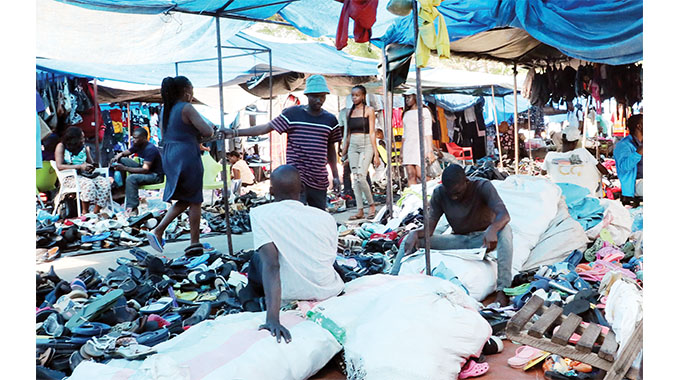Secondhand clothes dealers adapt to new normal

Melody Dube, Features Reporter
The buying and selling of imported clothing, mostly secondhand, commonly known as bales, continues to grow in popularity across the country.
This is because of their affordability as well as being a lucrative business for those who sell them.
The clothing such as denim jeans, formal wear, gym wear, lingerie, running shoes, winter jackets, handbags, and so on is imported in bales from different countries. It comes in all sizes for both males and females.
The business, which started with a few locations in Bulawayo a few years ago has spread widely, penetrating even into people’s homes.
However, the centre of the sale of secondhand clothing was around the Revenue Hall, with the place gaining the name ‘KoKhothama’.
Boundless sellers would gather up at Khothama displaying their different products for the customers to choose. The place was always packed with customers who were wooed by low prices and the quality of bales as compared to buying from the shops.
Popular mainstream clothing stores started to slowly lose the market especially when the economy took a knock.
In the years 2015/18, many low income earners such as tertiary students had shifted to buying their clothes from Khothama.
However, with the emergence of the Covid-19 pandemic, sellers at Khothama were forced to disperse. As most businesses moved to providing online services through the use of social media platforms, the bales business was one of those that adopted this new culture.
Most sellers took their businesses to cheaper social media platforms like Facebook and WhatsApp where they could reach many customers to advertise their products. They create chat groups with their loyal customers for placement of orders. It is in these groups where modes of payment and delivery of the products would be discussed between the buyer and seller.
Some went on to sell from their homes. They would display their products outside their gates for interested passersby to buy. Some, after the easing of the lockdown, started going door to door to easily locate as well as reach customers.
Several people in this business testified to the fact that selling bales has improved their lives.
Miss Tashi Ndlovu, who has been in the business for six months sells her bales from Maphisa in Matabeleland South province. She said her life has significantly improved since she ventured into the business.
“I have witnessed my life change in my six months in the business. I first got into this business by purchasing some tops which were specifically for youths from someone in Harare. The tops were going for US$1 each, so I bought 50 of them which I then sold for US$2 each going up, depending on the quality. I wanted to see whether I would gain a market and surprisingly, I did. I then used the profit to get a full bale of socks,” said Miss Ndlovu.
She said getting into the business was quite simple for her as wholesale prices for purchasing were cheap.
“The person who sold a bale to me the first time became my agent. Basically what I do is that I give her the orders from my customers which she has to specifically look for. For instance, if I get orders for skirts she would have to look for that. Products are delivered to me and once they are found, I collect them from town.
“I have been selling my products in Maphisa because there is a wider market there. The area does not have many sellers yet like here in Bulawayo,” she said.
Miss Ndlovu said for her to get orders, she has been using WhatsApp to reach customers through advertising on statuses. She also has a group that she uses to inform customers about the products on trend and to receive suggestions from them as well.
“This business has greatly assisted me financially. I can now buy my own toiletries. I have saved enough for my school fees next semester.
The feeling of being independent is just satisfying,” she said.
Miss Ndlovu is grateful for the business although it has its own lows such as failing to sell all the products whereas at times she fails to get customers completely.
Mrs Esnathi Gumede who sells her bales at the market along Lobengula Street in Bulawayo said that the business has kept her and her family afloat.
“I have been in this business for five years and if I have stayed this long it shows that the business is doing well. It has kept me and my family afloat,” she said.
Mrs Gumede also has an agent who provides her with the products she needs.
“I usually place my orders with someone who buys the bales from Mozambique. All we do is inform the person about what we need and give them the money to buy for us from Mozambique. The people who buy for us are those we are familiar with,” she said.
Mrs Gumede said the only risk is that sometimes an agent can fail to deliver the products after having taken the money.
One would have to place another order and run a loss because there are no refunds in this type of business.
“The only risk involved in this business is that you can fail to get your products after having paid for them. It happens that people who buy for us sometimes get arrested at the border posts and therefore we lose everything,” she said.
Miss Tanaka Mbwetu, a single mother of three who is an agent, gave an insight on how purchasing bales from other countries is handled.
“I have worked as an agent of purchasing bales from China for two years. What happens is that I receive orders from different customers which I then send to my partner who is based in China. Once he gathers those orders, I then pay my deposit which is half of all costs because we share them equally.
“I would have taken that money from my customers here in Zimbabwe and it is the money that will be used for shipment. Shipping the products to Zimbabwe can take up to three weeks now due to disturbances as a result of the Covid-19 pandemic,” said Miss Mbwetu.
She said business has been going well for her because customers trust her service.
“I am grateful to the customers who always order from me because it is not easy to trust someone with your money nowadays. Through the profit I gain from shipping their products, I am able to pay for my kids’ school expenses,” she said.
This type of business is convenient for sellers and customers in that it is a cash and carry business, which is good for sellers and the products are always cheap, which is an advantage for customers.
Miss Nozinhle Ncube said she prefers to buy clothes from bales instead of going to an actual shop.
“I have survived on bales for a long time now. These products are far much better than those sold in shops because they are of good quality and cheap at the same time. For, instance I bought three good winter jackets in town last week and they only cost me US$9.
“If I had gone to a shop or a boutique, I would have paid over US$20 for each,” she said.
Another bale buyer, Miss Lubelihle Ndlovu said buying from bales was convenient.
“I am part of many WhatsApp groups where people from Bulawayo sell their bales. Once I spot something I want, I inform the seller and pay my deposit for the item. Sometimes I get a home delivery provided the seller lives near me, but most of the times I collect from town.
The sellers have been very reliable,” she said.
The bale business has significantly improved the livelihoods of many across the country where there are limited formal employment opportunities.
The business itself is diverse, starting from the purchasing to transportation and delivery, the final stage.
Different sellers purchase from different countries as per their preferences. The common countries where many buy their bales from are China, United Kingdom, Mozambique and South Africa. Those who purchase from the furthest countries have their goods shipped to Zimbabwe.
The business has majorly created employment for many in the chain.












Comments